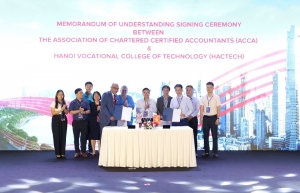Management accounting: a key tool in sustainable development
While the world economy is undergoing many changes, especially in management, economics, technology, and sustainable development, new technologies and AI are promoting the digitalisation process globally, opening up new opportunities for businesses to improve management efficiency and optimise processes.
 |
However, there are also challenges related to resource management, environmental impact, climate change, and increasing demands for sustainable development. Countries and businesses around the world are facing great pressure to adapt to such change and build sustainable financial and business management strategies to maintain competitiveness.
Nguyen Anh Thu, vice-rector of VNU - University of Economics & Business, believes management accounting is no longer just about tracking financial performance; it has become a powerful tool for promoting sustainable growth and fostering digital innovation.
"We are entering an era of digital transformation, where technologies such as AI, big data analytics, and blockchain are reshaping the way businesses operate. Simultaneously, we are also confronted with the pressing issue of sustainability, a global priority that requires every organisation to think about its impact on the environment and society," said Thu.
"The themes of the plenary session on navigating the digital landscape are critical for the profession's future and for the responsible development of businesses worldwide. We need to consider how digitalisation and sustainability can be harmonised through advanced management accounting practices to build resilient and ethical organisations," Thu added.
 |
| Prof. Gerhard Schorr, former member, Executive Board, Baden-Württemberg Cooperative Audit Association |
Prof. Gerhard Schorr - former member of the Executive Board of the Baden-Württemberg Cooperative Audit Association in Germany, spoke about green finance in the EU. The European Green Deal from 2019 aims to achieve climate neutrality by 2050 by reducing pollution, protecting wildlife and tress, utilising clean products and technologies, and ensuring a just and inclusive green transition.
These solutions are based on EU taxonomy, EU green bonds, Sustainable Finance Disclosure Regulation, Corporate Sustainability Reporting Directive and EU Climate Law. SFDR is related to disclosures of sustainability, which can be useful information for investors.
"EU taxonomy is a sophisticated system for recording economic activities as green, but not all economic activities have a chance to contribute to environmental objectives – that's frustrating for many undertakings," said Schorr.
EU taxonomy encompasses a standard set of definitions for sustainable activities centred around climate change mitigation and adaption, the sustainable use and protection of water and marine resources, the transition to a circular economy, waste prevention and recycling, pollution prevention and control, and to the protection of healthy ecosystem.
 |
| Prof. Shahzad Uddin, director, the Centre for Accountability and Global Development, Essex Business School |
Prof. Shahzad Uddin - director of the Centre for Accountability and Global Development under Essex Business School, University of Essex, said, "Digitalisation changes the nature of work, with automation and AI potentially displacing traditional jobs while creating new opportunities in digital industries. Research should explore the future of work, including remote working, the gig economy, and the skills needed for a digital workforce."
"Moreover, digitalisation affects social interactions, communication, and culture. Studies should examine how social media, digital content creation, and online communities redefine identity, influence politics, and shape public opinion." said Uddin, before adding, "Issues of digital access focus on how digitalisation can both bridge and widen gaps between different social groups, regions, or countries, leading to debates on the digital divide and inclusivity."
Assoc. Prof. Svelana Tereshchenko from Saint Petersburg State Forest Technical University in Russia shared her views concerning sustainable development in her home country.
According to a report on Sustainability Reporting Practice of Russian Enterprises, in 2023, Russia's sustainable development agenda remained relevant despite the pressure of geopolitical risks. 68 per cent of respondents said that sustainable development is still a priority for them, and 19 per cent said that sustainable development is still included in their development strategy, although funding has been reduced.
"More and more companies consider the requirements of the Moscow Exchange and the Central Bank of the Russian Federation, and many firms are also orientated towards the UN Sustainable Development Goals," Tereshchenko said.
"This growing emphasis on social responsibility shows that Russian enterprises are paying more attention to social responsibility," she added.
 | ACCA and vocational colleges to enhance business training The Association of Chartered Certified Accountants (ACCA) signed MoUs with Hanoi Vocational College of Technolgy, and Hanoi College of Commerce and Tourism on May 29. |
 | Accounting and finance professionals to work together on green goals The Association of Chartered Certified Accountants (ACCA) and the Academy of Finance (AoF) are committed to promoting sustainable growth by equipping professionals with green skills. |
 | Collaboration can build green-skilled accounting community The Association of Chartered Certified Accountants has been expanding its collaboration with government agencies to equip accounting professionals in with green skills through its digital-first approach, driving sustainable economic growth in Vietnam for years to come. |
What the stars mean:
★ Poor ★ ★ Promising ★★★ Good ★★★★ Very good ★★★★★ Exceptional
Related Contents
Latest News
More News
- $100 million initiative launched to protect forests and boost rural incomes (January 30, 2026 | 15:18)
- Trung Nam-Sideros River consortium wins bid for LNG venture (January 30, 2026 | 11:16)
- Vietnam moves towards market-based fuel management with E10 rollout (January 30, 2026 | 11:10)
- Envision Energy, REE Group partner on 128MW wind projects (January 30, 2026 | 10:58)
- Vingroup consults on carbon credits for electric vehicle charging network (January 28, 2026 | 11:04)
- Bac Ai Pumped Storage Hydropower Plant to enter peak construction phase (January 27, 2026 | 08:00)
- ASEAN could scale up sustainable aviation fuel by 2050 (January 24, 2026 | 10:19)
- 64,000 hectares of sea allocated for offshore wind surveys (January 22, 2026 | 20:23)
- EVN secures financing for Quang Trach II LNG power plant (January 17, 2026 | 15:55)
- PC1 teams up with DENZAI on regional wind projects (January 16, 2026 | 21:18)

 Tag:
Tag:





















 Mobile Version
Mobile Version